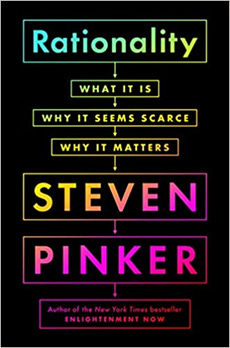Review of RATIONALITY
Steven Pinker on why humanity is losing its mind
Steven Pinker’s writings have had a great influence on me professionally. The first book of his I read in my first year of graduate school, The Blank Slate, had an enormous impact on my professional thinking and was my first exposure to the field of behavior genetics, of which I focused much of my thinking on later during my PhD. His book, The Sense of Style, gave me foundational knowledge of how to write well (in addition to the rigorous training provided by my PhD advisor Todd Shackelford).
There is no denying that Pinker is one of the great science writers of our time, having published a wide array of bestselling books on topics from language to war and, most recently, rationality.
Rationality: What It Is, Why It Seems Scarce, Why It Matters is Pinker’s broad attempt at answering a question he often receives from his colleagues and admirers: “Why is humanity losing its mind?” It’s easy to ask this question given the seemingly gradual unraveling of our American society in the last decade. Pinker’s answer to this is that a suite of cognitive biases, heuristics, and statistical ignorance often lead humans to incorrect, or irrational, decisions.
The good news, however, is that some dedicated cognitive effort can help us override these biases and apply rational thought to pressing issues of humanity. A bit quixotic in my humble opinion, but I get the sentiment.
For those interested in leading a more rational intellectual life, Pinker’s Rationality does provide a fantastic overview of the basics that are often (or should be) the topic of many university courses on logic, statistics, and human behavior. The thrust of his book covers principles of logic, probability theory, bayesian reasoning, causal reasoning, and game theory among other topics. In his classic writing style, Pinker delves into the details, providing amble examples and visuals as he moves through each chapter.
I made the mistake, however, of listening to this book on audio. I’m not sure what I was expecting about the book, but after being a couple chapters in, I realized this book would have been much better in a classical reading format because of the formulas and visuals he presents, which would have been great to be able to see while reading and being able to work through the example problems more carefully. Unfortunately, I don’t think I got as much out of the book as I could have due to the format I read it in.
Readers familiar with the typical girth of Pinker’s books, of which Sam Harris likens to a “door stop,” will be pleased that this is a relatively short piece of work. I say relatively because the book is still a hefty 340 pages of primary content. Overall, Rationality is a practically useful and comprehensive overview of many core principles and theories that underpin logic and statistical reasoning, though it is not, in my opinion, a relaxing read for a cozy fall evening on the couch.
Published: September 2021
Format: Audio
If you think this sounds interesting, you may also like:
Calling Bullshit: The Art of Skepticism in a Data-Driven World by Carl Bergstrom and Jevin D. West (2020)
The Book of Why: The New Science of Cause and Effect by Judea Pearl and Dana Mackenzie (2018)
Please note: this post contains affiliate links, allowing me to earn a small commission when you purchase books from the link provided. There is no cost to you, and this will allow me to keep this newsletter free and open to all. Happy reading!



